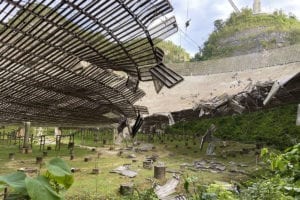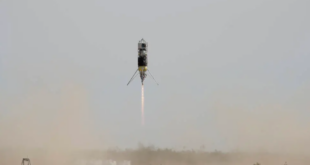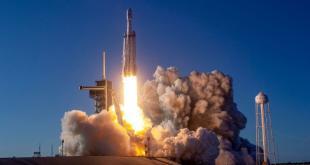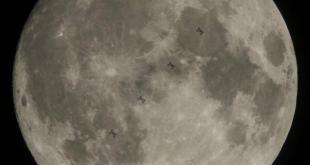
One of the auxiliary cables that helps support a metal platform in place above the Arecibo Observatory in Puerto Rico, broke on Monday (Aug. 10) causing a 100-foot-long gash on the telescope’s reflector dish. Operations at the University of Central Florida (UCF) -managed observatory are stopped until repairs can be made. The break occurred about 2:45 a.m.
When the three-inch cable fell it also damaged about 6-8 panels in the Gregorian Dome, twisting the platform used to access it. It is not yet clear what caused the cable to break. “We have a team of experts assessing the situation,” says Francisco Cordova, the director of the observatory. “Our focus is assuring the safety of our staff, protecting the facilities and equipment, and restoring the facility to full operations as soon as possible, so it can continue to assist scientists around the world.”
“We have a team of experts assessing the situation,” says Francisco Cordova, the director of the observatory. “Our focus is assuring the safety of our staff, protecting the facilities and equipment, and restoring the facility to full operations as soon as possible, so it can continue to assist scientists around the world,” according to Eng. Francisco Cordova, Director of the Arecibo Observatory.
UCF manages the NSF-facility under a cooperative agreement with Universidad Ana G. Méndez and Yang Enterprises Inc. The facility, which is home to one of the most powerful telescopes on the planet, is used by scientists around the world to conduct research in the areas of atmospheric sciences, planetary sciences, radio astronomy and radar astronomy.
Arecibo is also home to a team that runs the Planetary Radar Project supported by NASA’s Near-Earth Object Observations Program in NASA’s Planetary Defense Coordination Office through a grant awarded to UCF.
The facility has endured many hurricanes, tropical storms and earthquakes since it was built 50 years ago. Repairs from Hurricane Maria in 2017 are ongoing. Through it all, the facility has continued to contribute to significant breakthroughs in space research in the area of gravitational waves, asteroid characterization, planetary exploration and more.
 SpaceWatch.Global An independent perspective on space
SpaceWatch.Global An independent perspective on space




